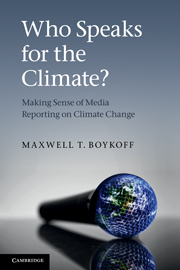3 - Fight semantic drift
Confronting issue conflation
Published online by Cambridge University Press: 05 June 2012
Summary
Few things are as much a part of our lives as the news…it has become a sort of instant historical record of the pace, progress, problems and hopes of society.
(Bennett, 2002)
People typically do not start their day with a morning cup of coffee and the latest peer-reviewed journal article. Instead, citizens turn to mass media – television, newspapers, radio, internet and blogs – to link formal science and policy with their everyday lives. Members of the ‘Fourth Estate’ function as important interpreters of climate information: the public citizenry frequently learn about climate science, policy and politics from news and entertainment media. Studies across many decades have documented that consumer-citizens access understanding about science (and more specifically climate change) largely from the mass media (e.g. Nelkin, 1987; Antilla, 2010). In this context, central, fundamental and immediate challenges pervading media portrayals of climate change are those of fairness, accuracy and precision. While the previous chapters featured the quantity of news coverage on climate change and global warming, the next chapters take up issues involving content and quality of coverage.
In the high-stakes milieu of reporting, journalists, producers and editors as well as scientists, policymakers and non-nation-state actors must scrupulously and intently negotiate how climate becomes articulated. Whenever biophysical phenomena – such as changing precipitation patterns or changing ice-sheet dynamics – are captured and categorized through media portrayals or elsewhere, they undergo varying degrees of interpretation and are influenced by power and scalar factors (Jasanoff and Wynne, 1998). In this process, certain media ‘storylines’ gain salience (Hajer, 1993). Nonetheless, media reports have often conflated the vast and varied terrain – from climate science to governance, from consensus to debate – as unified and universalized issues.
- Type
- Chapter
- Information
- Who Speaks for the Climate?Making Sense of Media Reporting on Climate Change, pp. 53 - 75Publisher: Cambridge University PressPrint publication year: 2011



